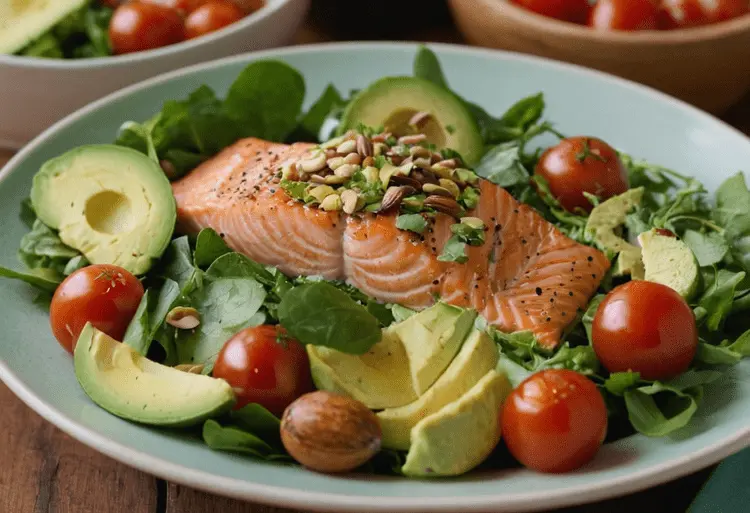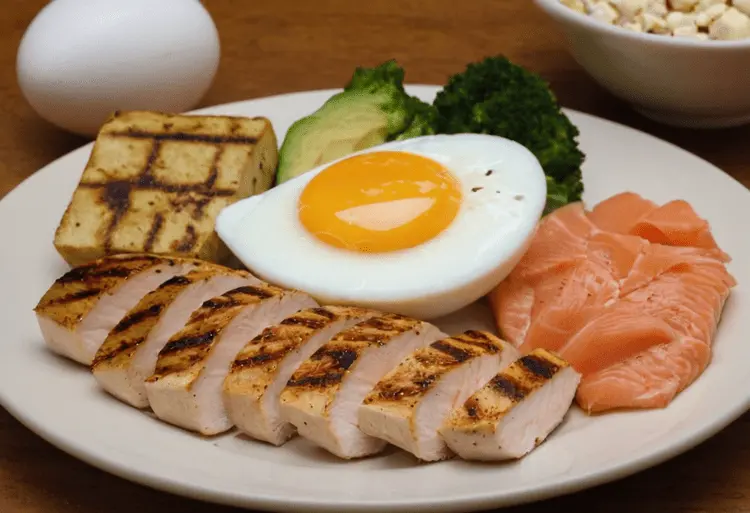Low-Carb, High-Protein Diets: Are you tired of feeling sluggish after meals or constantly craving sugary snacks? Ever wondered if there’s a way to fuel your body for energy and satiety while still enjoying delicious food?
Enter the low-carb, high-protein diet – your ultimate guide to feeling full, energized, and achieving your health goals. This eating style, also known as LCHP or a protein-rich, low-carb diet, is taking the wellness world by storm, and for good reason.
By prioritizing protein and healthy fats while cutting back on refined carbs, you can unlock a host of benefits, from weight loss and muscle building to improved blood sugar control and mental clarity.
Whether you’re a seasoned keto enthusiast or simply curious about exploring a low-carbohydrate high-protein plan, this comprehensive guide will equip you with everything you need to know.
We’ll delve into the science behind this eating style, explore delicious low-carb high-protein foods and recipes, and provide practical tips for incorporating this lifestyle into your daily routine.
Low-Carb, High-Protein Diet: A Snapshot
- Prioritizes protein, healthy fats
- Limits refined carbohydrates
- Boosts satiety, metabolism
- Aids weight loss, muscle building
- Improves blood sugar control
Table of contents
- The Low-Carb, High-Protein Buzz: Is It Right For You?
- The Amazing Benefits of Low-Carb, High-Protein Diets
- Risks and Considerations of Low-Carb, High-Protein Diets
- Embarking on Your Low-Carb, High-Protein Journey
- Your Low-Carb, High-Protein Journey Starts Now
- Your Burning Questions About Low-Carb, High-Protein Diets – Answered!
The Low-Carb, High-Protein Buzz: Is It Right For You?

Ever wondered why everyone seems to be talking about low-carb high-protein diets? Are you curious about whether this trendy approach is just another fad or a real game-changer for your health goals? Let’s dive in and separate the hype from the facts.
What Exactly IS a Low-Carb, High-Protein Diet?
In a nutshell, a low-carb, high-protein diet involves reducing your carbohydrate intake while increasing your protein consumption.
But what does “low-carb” and “high-protein” actually mean? It’s not as black and white as it seems, with variations like ketogenic (very low-carb) and moderate low-carb approaches.
The Carb Conundrum and Protein Powerhouse
Ever wondered how our bodies use these macronutrients? It’s a fascinating dance! Carbs are our primary energy source, but our bodies can also turn protein into energy if carbs are scarce. How the Body Uses Carbs and Protein To understand this process fully, let’s explore the science of macronutrient metabolism in more detail.
To make informed choices about low-carb high-protein diets, it’s crucial to understand their impact on our metabolism. This involves delving into the roles of key players like insulin and glucagon, as well as the intriguing state of ketosis.
Why All the Fuss? Potential Benefits of a Low-Carb, High-Protein Diet
The appeal of low-carb high-protein diets goes beyond just weight loss. People are drawn to this approach for various reasons, including:
- Shedding Pounds and Sculpting Your Physique: Research suggests that this diet can help reduce appetite, burn fat, and even preserve muscle mass.
- Taming Blood Sugar: For those with diabetes or prediabetes, low-carb diets can be a game-changer in managing blood sugar levels.
- Boosting Brainpower and More: Some people report increased mental clarity, reduced inflammation, and even potential benefits for certain neurological conditions.
But Is It For Everyone?
As with any dietary change, low-carb high-protein diets aren’t a one-size-fits-all solution. They might be especially beneficial for some, while others might experience challenges. We’ll delve into these considerations later.
Curious to learn more? Stick with us as we unpack the science, benefits, risks, and practical tips for thriving on a low-carb, high-protein diet. Feel free to share your thoughts, questions, or experiences in the comments below!
Intrigued by the power of protein? While low-carb diets offer amazing benefits, a high-protein approach can be a game-changer for those seeking peak performance and body composition. Dive into our comprehensive high-protein diet guide to uncover the secrets of protein-powered health.
The Amazing Benefits of Low-Carb, High-Protein Diets
Ever wondered why everyone’s buzzing about low-carb high-protein diets? It’s not just hype; there’s some serious science backing the benefits. So, let’s dive into the juicy details!
Weight Loss and Body Composition
Craving a slimmer waistline? Low-carb high-protein diets are renowned for boosting satiety (that feeling of fullness). This translates to fewer cravings and easier portion control.
Studies also show these diets excel at torching fat while preserving those hard-earned muscles. So, you’ll be sculpting that dream physique in no time!
Blood Sugar Regulation
Struggling with blood sugar spikes? Low-carb high-protein diets are like a superhero for insulin sensitivity. They help your body utilize insulin more efficiently, which can be a game-changer for managing diabetes or prediabetes.
Plus, you’ll be mastering the glycemic index and load, ensuring your meals keep your blood sugar steady throughout the day.
Heart Health
A healthy heart is a happy heart! Research suggests low-carb high-protein diets may improve your cholesterol profile when you prioritize those good-for-you fats.
Some studies even link them to lower blood pressure and triglyceride levels. It’s all about fueling your body with the right stuff!
Other Potential Perks
Feeling foggy? Low-carb high-protein diets might just sharpen your mental clarity and focus. Plus, they have anti-inflammatory properties and could even benefit certain neurological conditions. It’s a win-win for your mind and body!
Risks and Considerations of Low-Carb, High-Protein Diets

Embarking on a low-carb, high-protein journey? That’s awesome! But hold on – let’s chat about some potential bumps in the road. Have you ever wondered if these diets are missing some key nutrients? Or how they might affect your energy levels?
Nutrient Deficiencies: Are You Missing Out?
While low-carb, high-protein diets offer amazing benefits, they can sometimes fall short on essential nutrients. Fiber, a carb found in fruits, vegetables, and whole grains, is often limited on these diets.
But why does fiber matter? It keeps your digestive system happy and plays a role in heart health. You may also miss out on certain vitamins and minerals, like vitamin C, potassium, and magnesium.
So, what’s the solution? Focus on nutrient-dense, low-carb veggies like leafy greens, broccoli, and cauliflower. And don’t forget to consult a registered dietitian or doctor to see if you need supplements to fill any gaps.
The “Keto Flu” and Other Side Effects
Ever heard of the “keto flu”? It’s a group of temporary symptoms like headache, fatigue, and nausea that some people experience when starting a low-carb diet. Not everyone gets it, but it’s good to be prepared.
Other potential side effects include:
- Constipation or diarrhea (hello, fiber deficiency!)
- Bad breath (a common side effect of ketosis)
- Muscle cramps (possibly due to electrolyte imbalances)
Don’t worry, though! Most of these issues are temporary and can be managed with simple strategies like drinking plenty of water, increasing salt intake, and eating more fiber-rich, low-carb veggies.
Who Should Proceed with Caution?
Low-carb, high-protein diets aren’t for everyone. People with certain medical conditions like kidney disease or liver problems should steer clear.
Pregnant and breastfeeding women, as well as athletes with intense training schedules, should also consult a healthcare professional before jumping on board.
Embarking on Your Low-Carb, High-Protein Journey
Ready to dive into the world of low-carb, high-protein eating? Let’s break down the practical steps to make this diet work for you.
Finding Your Perfect Macronutrient Balance
Have you ever wondered what the ideal ratio of carbs, protein, and fats is for your body? The answer isn’t one-size-fits-all. Low-carb, high-protein diets come in various forms, from the strict ketogenic approach to more moderate options.
Calculating Your Macros:
- Ketogenic: Typically around 70-75% fat, 20% protein, and 5-10% carbs.
- Moderate Low-Carb: A broader range, often around 40-50% fat, 30-35% protein, and 15-25% carbs.
The question is, which one aligns with your goals and lifestyle? Experimentation is key. Consider using online calculators or consulting a registered dietitian to personalize your macros.
Tracking Your Intake:
Keeping tabs on your macros might seem tedious, but it’s a game-changer. Are you a fan of food journaling or using apps to track your meals? These tools can help you stay on track and ensure you’re hitting your targets.
Fueling Your Body with the Right Foods
What are the stars of a low-carb, high-protein diet? Think protein powerhouses like:
- Meat: Beef, pork, lamb, poultry (skinless)
- Fish & Seafood: Salmon, tuna, shrimp, cod
- Eggs: Nature’s perfect protein
- Dairy: Greek yogurt, cottage cheese, hard cheeses
- Plant-Based: Tofu, tempeh, edamame, lentils
Pair these with non-starchy vegetables like leafy greens, broccoli, cauliflower, and zucchini.
Healthy Fats:
- Avocados: Creamy and packed with nutrients
- Nuts & Seeds: Almonds, walnuts, chia seeds, flaxseeds
- Olive Oil: A heart-healthy staple
- Coconut Oil: Versatile for cooking and baking
Foods to Limit or Avoid:
- Sugary Drinks: Soda, juice, sweetened coffee
- Refined Grains: White bread, pasta, pastries
- Starchy Vegetables: Potatoes, corn, peas
- Processed Foods: Often high in hidden sugars and carbs
Remember, reading food labels is your superpower! Check for hidden carbs and added sugars.
Navigating Meal Planning and Recipes
Are you looking for delicious low-carb, high-protein meal ideas? We’ve got you covered with a 7-day sample meal plan, including vegetarian and vegan options. Share your favorite recipes and tag us on social media!
Your Low-Carb, High-Protein Adventure Awaits
With the right knowledge and a dash of creativity, thriving on a low-carb, high-protein diet is totally achievable. Don’t forget to leave us a comment below and share your experiences. We’re in this together!
Your Low-Carb, High-Protein Journey Starts Now

The Verdict on Low-Carb, High-Protein? It’s not just a diet; it’s a lifestyle shift with potential for incredible transformations. But, like any journey, it’s your unique path to forge.
Remember, your body is your most valuable asset. Fuel it wisely with nutrient-dense choices, prioritize protein power, and watch how your energy levels soar.
Still Curious? Ask Away!
- Have you tried a low-carb, high-protein diet before?
- What’s your biggest hurdle when it comes to managing your macros?
Dive Deeper into the Science
Ready to geek out on the nitty-gritty? Learn exactly how your body processes carbs and protein, and why that matters for your health and goals.
Personalized Nutrition is Key
Remember, there’s no one-size-fits-all here. Before diving in, it’s always wise to chat with a healthcare professional or registered dietitian. They can tailor a low-carb, high-protein approach that aligns with your unique needs and goals.
Share Your Experience!
We want to hear from you! Drop a comment below and tell us about your low-carb, high-protein adventures. Have you discovered delicious recipes? Experienced amazing results? Tag us on your favorite social media platform and let’s build a community of empowered eaters.
Your journey starts now.
Love pasta but not the carb overload? High-protein pasta is your answer! Dive into our guide and discover how to make pasta night healthy and satisfying.
Your Burning Questions About Low-Carb, High-Protein Diets – Answered!
Ever wondered if a low-carb, high-protein lifestyle is sustainable, or if it’s just another fad diet? Let’s dive into the most common questions swirling around these diets.
Yes, it’s often effective for weight loss due to increased satiety and boosted metabolism.
Focus on lean meats, fish, eggs, low-carb vegetables, nuts, seeds, and healthy fats like avocado and olive oil.
Include protein sources in every meal and snack. For example, a 3-ounce serving of chicken breast provides around 30g of protein.
There are variations, but common names include the Atkins diet, ketogenic (keto) diet, or simply a low-carb, high-protein (LCHP) diet.
Absolutely! But there’s a catch. It’s crucial to focus on whole, nutrient-dense foods and ensure you’re getting enough fiber, vitamins, and minerals. Talk to your doctor or a registered dietitian to tailor the diet to your specific needs.
You bet! Protein is the building block of muscle. In fact, combining a high-protein intake with strength training is a recipe for muscle growth.
Ketosis can accelerate fat burning, but it’s not mandatory for weight loss. Low-carb high-protein diets can be effective even without reaching ketosis, thanks to their impact on appetite and metabolism.
Women, especially those who are pregnant or breastfeeding, should be cautious with very low-carb approaches. It’s essential to get enough nutrients to support hormonal balance and overall health.
Consider your goals, lifestyle, and any underlying health conditions. If you’re unsure, consulting a healthcare professional is always a smart move. They can help you assess the potential benefits and risks based on your individual situation.